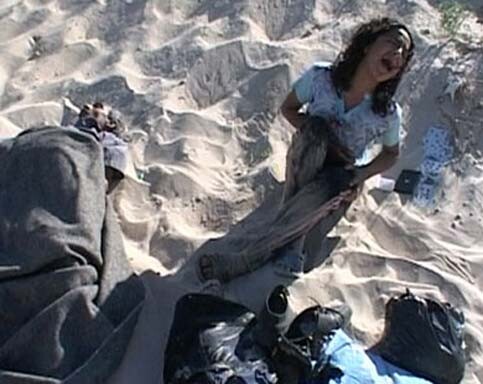The Electronic Intifada 19 June 2006

Huda Ghalia crying near her fathers body, as he and a number of members of his family were killed by the Israeli shelling on 9 June 2006. (TV)
The screaming of 11 year old Palestinian Huda Abu Ghalia from Gaza seems not to have reached American officials. Huda’s parents and five siblings were killed before her eyes last week when Israeli artillery crashed onto the beach as they picnicked. The US was the only major power which not only refused to condemn the incident, but described it as “self defense.” Afterwards, Israeli Prime Minister Ehud Olmert called Israel’s army the “most moral” in the world.
However, Amnesty International’s 2006 Report criticizes Israel’s excessive use of force: “Some 190 Palestinians[1], including around 50 children, were killed by the Israeli army in the Occupied Territories in 2005. Many were killed unlawfully, in deliberate and reckless shootings, shelling and air strikes in densely populated residential areas.”
Following years of Israeli oppression, in July, 2005 171 Palestinian civil society organizations initiated a global campaign calling for boycott, divestment and sanctions (BDS) against Israeli apartheid. A growing number of international organizations have responded to the call.
On May 22 the World Council of Churches (WCC), with 340 member churches in over 100 countries, declared that “Israel bears the responsibility for the present crisis of the Middle East.” In 2005 the WCC encouraged members to divest from Israel.
On May 27, the Ontario chapter of the Canadian Union of Public Employees, Canada’s largest union voted to “support the international campaign of boycott, divestment and sanctions” against Israel. On May 29, members of the National Association of Teachers in Further and Higher Education, Britain’s largest academic trade union, voted to boycott Israeli lecturers and academic institutions that did not publicly declare their opposition to Israeli policy in the Occupied Territories.
In 2004 The Presbyterian Church in the United States (PCUSA) voted to divest from companies supporting Israel’s occupation. That decision will be revisited this week at the PCUSA General Assembly in Alabama.
Nobel Laureate Archbishop Desmond Tutu has written, “Yesterday’s South African township dwellers can tell you about today’s life in the Occupied Territories….If apartheid ended, so can the occupation, but the moral force and international pressure will have to be just as determined. The current divestment effort is the first, though certainly not the only, necessary move in that direction.”
In the West Bank, every day I see, feel and touch the segregation between the Palestinian and Israeli communities: on the roads, at checkpoints, and through collective punishment of Palestinians.
When a suicide bomber targets Israeli civilians, Israeli forces often arrest his relatives and demolish his home within hours, without allowing the family to save their possessions.
In August 2005 a Jewish settler opened fire on civilians in Shfamar, an Israeli town, murdering four Palestinian citizens of Israel and injuring 15. The attacker, Natan Zada, lived in the West Bank settlement of Tapuah, near my village. I was curious to see if bulldozers would demolish his house and his family would be arrested. That didn’t happen. The massacre’s Palestinian victims weren’t recognized as “victims of a terrorist act” because Israeli law recognizes only “victims of Palestinian terrorism”.
Last month, the Israeli Supreme Court approved a law denying West Bank and Gaza Palestinians married to Israelis the right to live in Israel, cementing judicial support for apartheid.
In the region of Salfit where I live, the US government has funded a new Palestinian road network which completely separates Palestinian and Israeli traffic. As my village struggles with scarce water, across the road in the Israeli settlement of Ariel which is built on Palestinian land we see green lawns, sprinklers and swimming pools. According to the Israeli human rights organization B’Tselem, Palestinians are allotted just 70 liters of water per person, per day, while each Israeli consumes 350 liters daily.
Ronnie Kasrils, South Africa’s Intelligence Minister, called by Tutu “a Jewish hero of the anti-apartheid movement,” wrote in the UK Guardian in May, “The Palestine crisis is now more dramatic even than apartheid, but it is the victims who are punished.” Kasrils concludes, “Israel should face sanctions”.
I agree completely with Kasrils. Sanctions are a peaceful method to combat Israel’s racist acts against Palestinians in Israel and the Occupied Territories. Like the boycott imposed on the apartheid regime of South Africa, which forced that country to accept change, it’s the international community’s responsibility to boycott Israel in order to enhance peace and coexistence in the Middle East.
Editor’s Note
1. The Amnesty report is http://web.amnesty.org/report2006/isr-summary-eng#2. The Palestinian Red Crescent Society (the Middle East’s version of the Red Cross) reports that 255 Palestinans were killed in 2005. The Amnesty report does not specify its source for its 190 figure.
Related Links
Fareed Taamallah, a peace activist, works as the coordinator for the Palestinian Central Election Commission for the district of Salfit in the West Bank.


